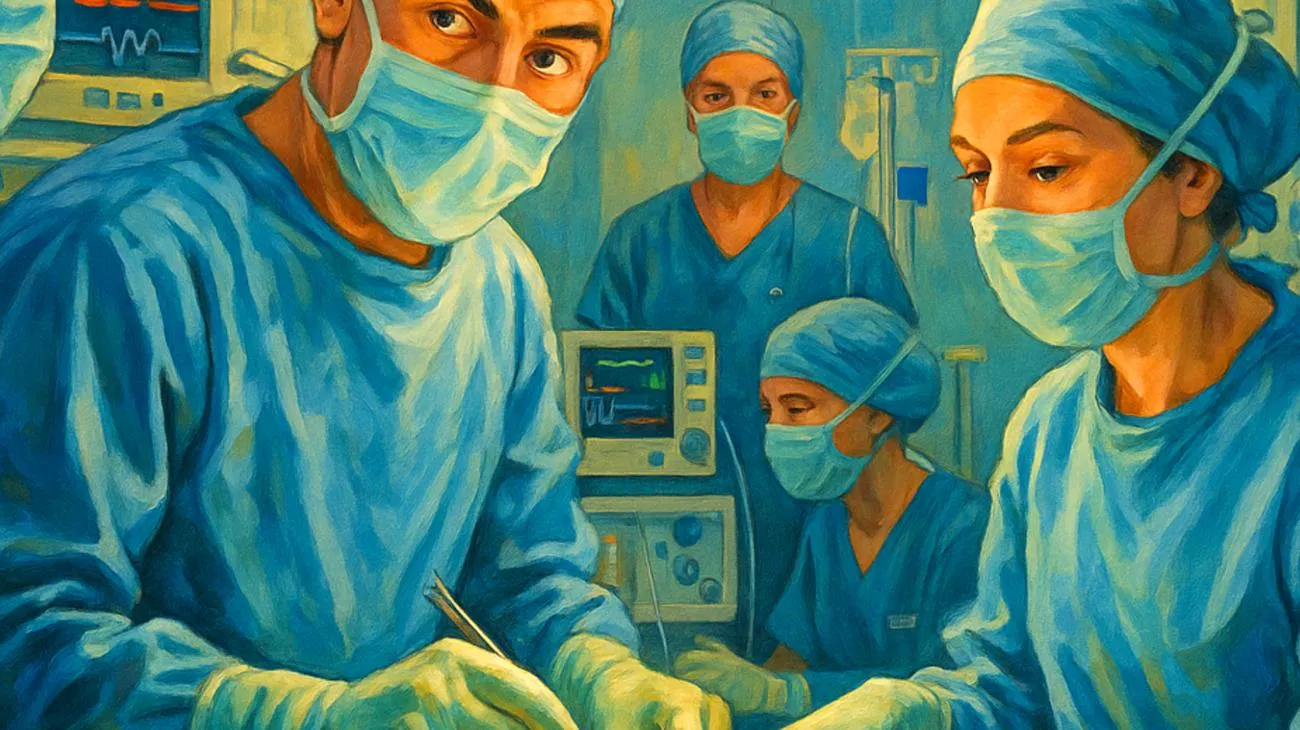Ever wondered what makes someone wake up every morning, grab a scalpel, and voluntarily spend their day slicing into other humans? While most of us panic at the sight of a paper cut, surgeons are out there performing literal brain surgery like it’s just another Tuesday. Turns out, science has finally cracked the code on what makes these medical marvels tick – and spoiler alert: they’re way weirder than you think.
Plot Twist: Surgeons Are Actually More Emotional Than You
Here’s where things get absolutely wild. Remember that stereotype about surgeons being cold, emotionless robots who traded their feelings for surgical skills? Yeah, that’s completely backwards. A massive 2018 study by Whitaker and colleagues surveyed nearly 600 surgeons using the gold standard of personality testing, and the results are mind-blowing.
These medical masterminds are actually more neurotic than regular people. Let that sink in for a second. The person performing your heart surgery is literally more emotionally sensitive and stress-prone than your average office worker. But before you start panicking about your next medical procedure, here’s the kicker – this might actually be exactly what makes them so good at their job.
Think about it: would you rather have a surgeon who’s completely unbothered by the fact that they’re holding your literal heart in their hands, or someone who’s acutely aware of every single risk and treats your life like the precious thing it is? That heightened emotional awareness isn’t a bug in their programming – it’s a feature that keeps you alive.
The Personality Recipe That Creates Medical Superhumans
Dutch researchers dropped another bombshell in 2022 when they discovered that surgeons aren’t just randomly chosen people who happened to be good at memorizing anatomy. They actually share a specific personality cocktail that’s so consistent it’s almost spooky.
First up: conscientiousness through the roof. These are the people who actually read instruction manuals, organize their sock drawers by color, and probably had color-coded notes in medical school. But it’s not just about being neat – we’re talking about an almost superhuman attention to detail that would drive most of us absolutely bonkers.
Here’s where it gets really interesting: surgeons also score higher in agreeableness, which completely destroys that whole “arrogant surgeon” stereotype we see in medical dramas. These findings suggest that successful surgeons are actually more cooperative and team-oriented than we give them credit for. Makes sense when you realize that surgery is basically the world’s most expensive team sport, where communication failures can be literally deadly.
The research also revealed elevated openness to experience, which is psychology-speak for “these people actually enjoy learning new stuff.” Considering that surgical techniques are constantly evolving and new technologies pop up faster than TikTok trends, this intellectual curiosity isn’t just helpful – it’s essential for staying relevant in a field where yesterday’s cutting-edge procedure might be tomorrow’s medical history.
The Stress Superpower You Never Knew Existed
The most fascinating discovery from the Leiden University Medical Center research might blow your mind: surgeons have developed what can only be described as stress superpowers. While the rest of us turn into anxious messes when our WiFi goes down, surgeons somehow get better at their job when the pressure increases.
This isn’t about being emotionless – it’s about having developed sophisticated emotional management skills that most of us can only dream of. Picture having an internal air traffic control system that can instantly prioritize, organize, and channel emotions productively even when everything around you is complete chaos. That’s essentially what these medical magicians have figured out how to do.
The really wild part? This isn’t something they necessarily learn in medical school. The research shows these traits are already present in surgical trainees, suggesting some people are just naturally wired to thrive in high-pressure situations. It’s like they won the genetic lottery for stress management.
The Career GPS Hidden in Your Brain
This research reveals something absolutely fascinating about how our brains secretly steer our life choices. We like to think we’re making rational career decisions based on salary, job security, and whether the office has good coffee. But the surgeon studies suggest our personalities are quietly acting like GPS systems, guiding us toward environments where our psychological strengths can shine brightest.
People with high conscientiousness, emotional regulation skills, and stress tolerance don’t just randomly decide to become surgeons one day. They’re subconsciously drawn to environments that perfectly match their psychological makeup. It’s like having personality-based matchmaking, but for careers instead of dating apps.
This explains why some people absolutely thrive in high-pressure situations while others burn out faster than a cheap candle. Surgeons aren’t superhuman – they’re just operating in their psychological sweet spot, where their natural traits become actual superpowers.
The Personality Patterns That Shape Medical Excellence
The research reveals several key psychological characteristics that consistently appear among successful surgeons:
- Enhanced emotional regulation – the ability to manage intense feelings without losing focus during critical procedures
- High stress tolerance – actually performing better under pressure rather than crumbling when stakes are highest
- Team-oriented leadership – combining strong communication skills with decisive decision-making abilities
- Continuous learning mindset – genuine curiosity about new techniques and willingness to adapt established practices
- Risk awareness sensitivity – heightened consciousness of potential complications without becoming paralyzed by possibilities
These traits work together like a finely tuned orchestra. The emotional sensitivity keeps them acutely aware of patient welfare, while stress tolerance prevents that sensitivity from becoming overwhelming during procedures. Their openness to experience drives continuous skill improvement, while conscientiousness ensures they never cut corners or skip important steps.
The Extraversion Plot Twist
Another stereotype gets completely demolished here: the antisocial surgeon who prefers organs to people. The research shows that surgeons are actually more extroverted than you’d expect. These aren’t socially awkward hermits who chose surgery to avoid human interaction – they’re often socially skilled people who can navigate complex hospital politics, communicate with worried families, and lead surgical teams through crisis situations.
This extraversion serves a crucial function in the operating room. Surgery requires constant communication, quick decision-making with input from multiple team members, and the ability to keep everyone calm and focused during challenging procedures. The introverted genius surgeon might excel technically but struggle with the intense interpersonal demands of leading a medical team.
What This Means for Career Satisfaction
The surgeon personality research reveals something profound about how we all navigate our lives and career choices. We’re not just logical decision-makers weighing pros and cons on spreadsheets – we’re complex psychological beings whose deep-seated personality traits influence our paths in ways we barely recognize.
Understanding these patterns helps explain why some people seem naturally suited for specific roles while others struggle despite having similar qualifications and training. It’s not just about intelligence, education, or even motivation – it’s about psychological fit between who you are and what your work demands from you.
For anyone considering a surgical career, this research suggests that honest self-awareness about your personality traits and stress responses could be incredibly valuable. Rather than trying to fit into some predetermined mold of what a surgeon should be, potential surgeons might benefit from understanding their own psychological strengths and how they align with surgical demands.
The surgeon research illuminates something universal about human motivation and professional satisfaction. We’re all unconsciously drawn to environments and roles that somehow match our psychological makeup, even when we’re not consciously aware of these influences driving our choices. Whether it’s the surgeon’s unique combination of conscientiousness, stress tolerance, and emotional regulation, or other professional personality patterns, these findings suggest that career satisfaction often depends heavily on alignment between our psychological nature and our work environment demands.
Understanding these psychological drivers doesn’t make surgical work any less impressive – it actually makes it more remarkable. These professionals have somehow managed to channel their natural psychological strengths into careers that benefit society while satisfying their own deep-seated psychological needs. That’s not just excellent medicine; that’s psychology working at its absolute finest.
Table of Contents

